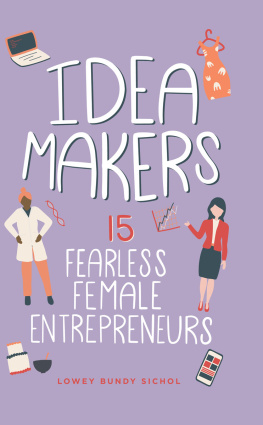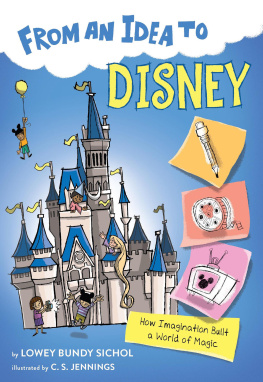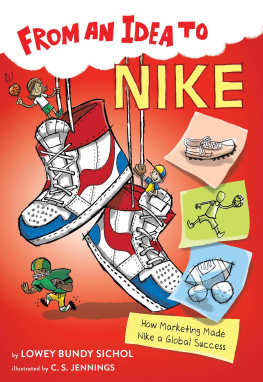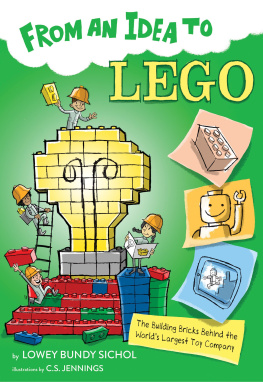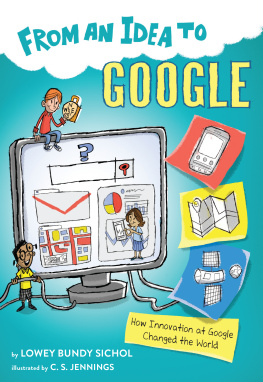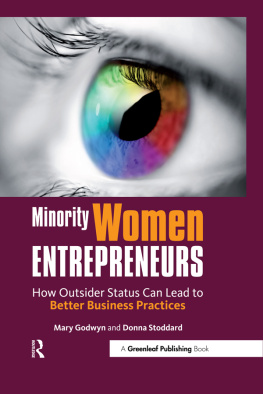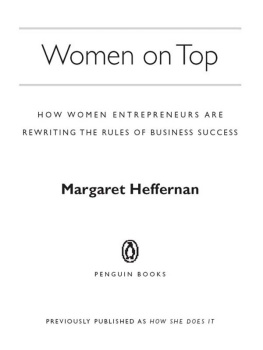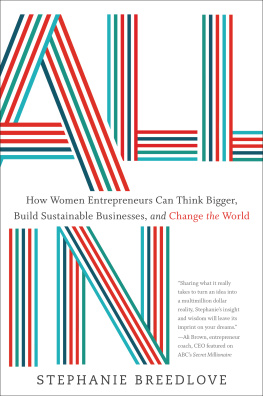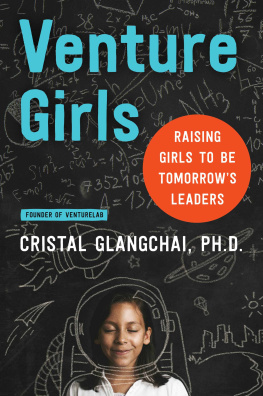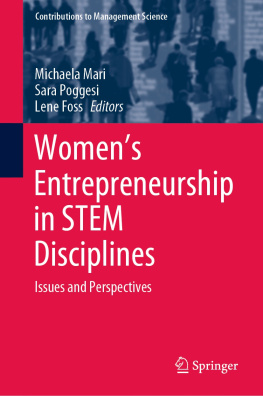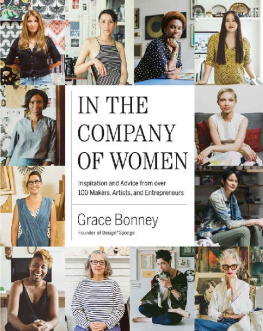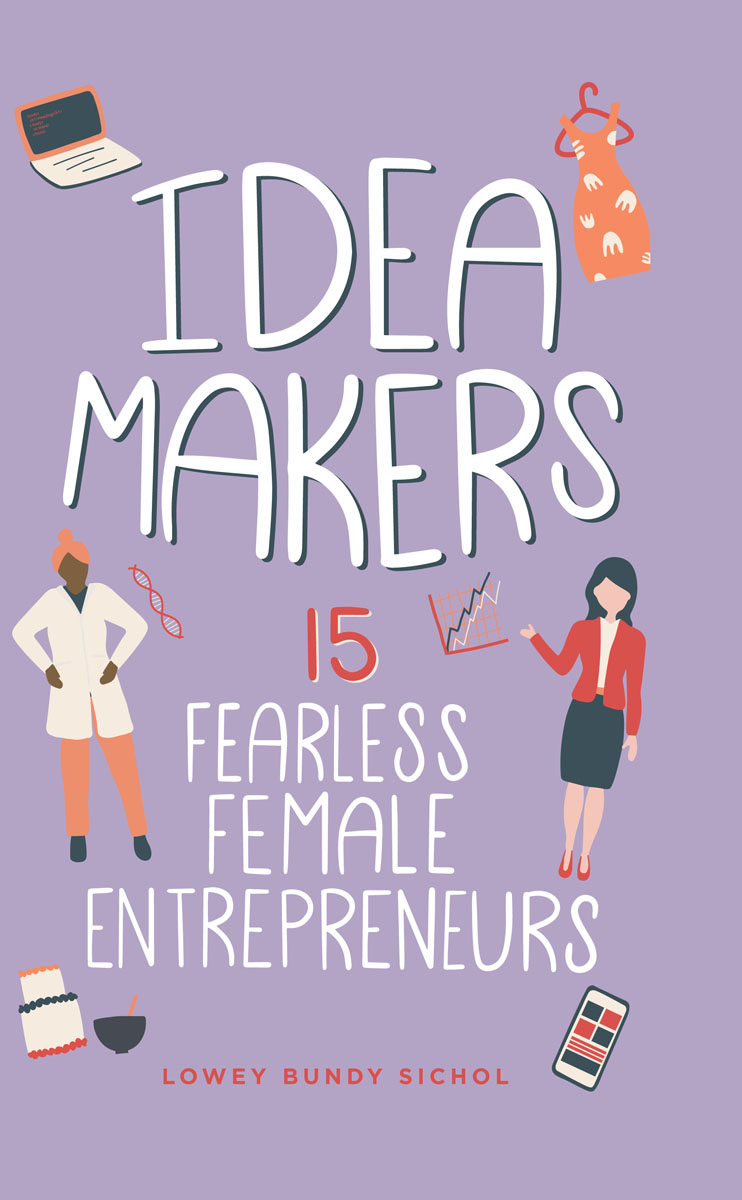
Copyright 2022 by Lowey Bundy Sichol
All rights reserved.
Published by Chicago Review Press Incorporated
814 North Franklin Street
Chicago, Illinois 60610
ISBN 978-1-64160-674-5
Library of Congress Control Number: 2021948296
Cover and interior design: Sadie Teper
Printed in the United States of America
5 4 3 2 1
For Carter, Peyton, and Tucker
Be Fearless.
Contents
Introduction
Have you ever thought, I wish someone made [insert idea here]? Or have you ever realized, I have a great idea for [insert idea here]? Or have you ever seen a new product and exclaimed, I could have invented that!
If your creative mind thinks this way, then you have the seeds of becoming an entrepreneur, a founder of a business. Today, there are more female entrepreneurs in the world than ever before: 12.9 million businesses are run by women in the United States, making up approximately 40 percent of all the companies in the United States. Together, these women-run businesses generate $1.9 trillion in sales each year! Also exciting is that 50 percent of women-operated businesses in 2019 were founded by women of color, and this number is increasing by about 7 percent each year.
But why do we rarely hear there their stories? And how can you start a business with your idea? This book was written to inspire kids to be the worlds next great entrepreneurs and business leaders. By reading the stories of how other people did it, you will learn how to do it yourself. (Thats also how the best business schools in the world teach entrepreneurship.)
Idea Makers: 15 Fearless Female Entrepreneurs is all about how 15 women turned their ideas into some of the biggest and most successful companies in the world. This book features female entrepreneurs in five industries: food, health and beauty, science and technology, education, and clothing and fashion. In each story, youll find common threads linking each of these women.
First, when each female founder was a young girl, she showed hints of what she was both good at and passionate about. For example, Anne Wojcicki loved biology throughout school, and Christina Tosi enjoyed baking for friends and family. These precocious interests would prove to be very important later in life.
Second, each female founder gained valuable experience at her first job, learning skills that would later help her run her business. For example, Alli Webb worked at a salon blowing out and styling hair, and Cindy Mi taught kids in China how to speak English.
Third, each female founder had a moment in her life when her idea really came to fruition. Sometimes it happened slowly over the course of several years, like Jasmine Crowes desire to feed hungry people. Sometimes it came out of survival like Kathleen King, who reinvented her cookie business after a bad partnership. And sometimes it hit like a bolt of lightning, like how Sara Blakely had her idea for a new type of undergarment for women while getting dressed for a party. But one thing they all had in commononce that idea was in their heads, nothing could stop them and they all dove into the world of entrepreneurship.
Together, these 15 women are worth billions of dollars, employ tens of thousands of individuals, and have gone on to change the world. Now, its your turn.

Kathleen King: Tates Cookies

Kathleen walked into the vacant bakery. Two other bakeries had rented the space before, the landlord explained, and the air still smelled like flour. The kitchen was fully equipped with professional baking equipment and a large refrigerator. The space wasnt huge, but significantly bigger than her mothers kitchen at the farmhouse where she had baked her cookies for almost a decade. And the quaint storefront would be perfect to display and sell her baked goods. There was even a cash register in place.
I wonder why the other bakeries failed, Kathleens mother wondered.
Well, its obvious, Kathleen explained confidently. They didnt have cookies as good mine.
Kathleen King was born on December 18, 1958. Her parents, Millie and Richard Tate King worked tirelessly to support their four children: Richie, Karin, Kevin, and Kathleen. Millie stood tall at five foot eight and was a registered nurse at Southampton Hospital, which brought in a meager but steady income. Her work schedule was anything but steady, however. Sometimes Millie worked the morning shift, which meant she had to arrive at work before the children woke up. And sometimes she worked the night shift, which meant she was gone the entire evening. As a result, Kathleen learned to be independent at a young age.
Tate, on the other hand, was a very short man, only five feet tall, about the height of an average seventh grader. But his short stature never held him back. He ran North Sea Farm, the family farm that included 15 acres of farmland, approximately 24 cows, and over 2,000 chickens. Tate sold milk to a local dairy and sold eggs to residents, restaurants, and grocery stores in Southampton, New York. Everyone knew and adored Tate King, who worked extremely hard, loved his community, and rarely left the farm. He often told his children, Were the richest family in town because were richest in family, friends, and spirit.
Despite laboring day and night to make ends meet, the King family did not have much money. They didnt go on vacations and never ate in restaurants. Sometimes, money was so tight that Tate would barter or trade animals from the farm for products or services his family needed. Once, he bartered half a steer to secure dentist appointments for his children.
But lack of money didnt stop Millie and Tate from being extremely generous with their time and resources. Tate loved to help his neighbors with odd jobs that needed attention. He believed if you had two apples, you sold one and gave the other away. Ive always told my kids to go out of your way for other people and help them every way you can, Tate once told Kathleen. If you can get along with people and youve got ambition, youve got it 95 percent made.
Mille and Tate King raised their four children to be fiercely independent with more responsibilities than most adults. They parented by this philosophy: If you can walk, you can work. Everyone pitched in and helped both in the house and on the farm, regardless of gender or age. I had a mother who was ahead of her time, Kathleen recalls. It was all about the work that needed to be done before the day was over, inside and outside the house. By the time I was 11, I could already make dinner, clean the house, do the laundry, work the farm, and wait on customers.
Growing up on the farm, Kathleen considered herself to be an average kid. She wasnt the smartest student in the class and often struggled with her schoolwork. She wasnt popular among the kids and felt more comfortable at the farm with her family. And she wasnt particularly athletic, either. But Kathleen was a tough kid with a great work ethic. I was also a tomboy, Kathleen says. Always dirty, always keeping up with everyone else on the farm. I firmly believed that if you could lift it, I could lift it.
Next page
